International Museum Day 2021
The Future Is Behind
- Film and Video
- Encounter
- Seminars and Lectures
- Guided Tour
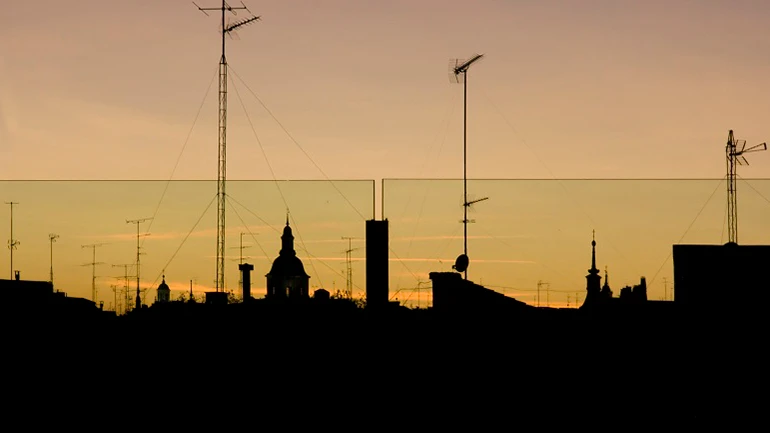
Held on 16 May 2021
In conjunction with International Museum Day, access will be free of charge on Sunday, 16 and Monday, 17 May. Book your free general admission here.
Once again, the Museo Reina Sofía participates in the annual International Museum Day —celebrated internationally since 1977 — under the 2021 slogan proposed by ICOM (the International Council of Museums) of “The Future of Museums: Recover and Reimagine”, and thus prompts a reconsideration of the idea of a living, open institution.
The notion of historical time as a dizzying, sped-up line of progress towards the future, and questioned by the current critical conditions and the perception of time at a standstill and repeated, forces us to rethink the meaning of museums, and their role, scale, evolution and future in order to deal with present-day challenges. Learning from other world views, those which conceive of a cyclical, spiralling time in which the past is ahead and the future is behind, contributes to a re-examination of where we are situated and the paths to imagine.
Therefore, in conjunction with International Museum Day, the Museo offers two days with free entry, on 16 and 17 May, in addition to a special programme of encounters, a film series, interventions, activations and guided tours.
In turn, the Museo once again joins Radio 3 to celebrate the day, offering, on Monday, 17 May, part of the station’s schedule from the rooms of the Collection.
Sponsor

-
Monday, 17 May, 2021 – 12pm and 5pm Nouvel Building, Library and Documentation Centre
The Permanence of the Ephemeral. Documentation Around Performance
The Museo Reina Sofía Library and Documentation Centre organise an encounter that gets under way with a guided tour around their facilities, showing the different services on offer to visitors and presenting a selection of different materials from their artistic holdings, materials used to document performance art. The ephemeral, fleeting and short-lived nature of performance actions means that faithfully recording them presents a challenge for artists, institutions and publishers alike. Therefore, this activity sets forth a reflection and debate on the recording and archiving of these formats.
On the basis of these materials and in order to delve deeper into this problem, the encounter concludes with the collaborative action Añadir contacto (Add Contact), whereby the protagonists are the same attendees in the encounter. The action draws inspiration from a collaborative performance from Andrés Senra that took place on Facebook and subsequently materialised into an artist’s book.
Length: 75 minutes each session
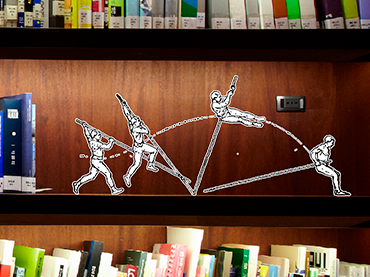
-
Tuesday, 18 May 2021 – 5:30pm Online platform
Dissent and Care. Reinventing the Museum
For decades now, the present and future of museums has been the source of perpetual public debate, in all likelihood on account of their capacity to configure narratives of collectiveness and conceive of new worlds. As a result, a large part of the tensions caused by culture wars crystallise in museums and stem from conflicts of economic, political and sensorial interests that cut through their foundations.
The debate today around their meaning, role, scale, evolution and future has intensified, to the extent that thinking about their legitimacy has become a question of survival. This encounter includes the participation of people involved in an array of museum institutions and situated in different contexts to share their experiences and projects.
Participants: Amanda de la Garza (director of MUAC, Mexico City), Elvira Dyangani Ose (director of The Showroom, London), Pablo Martínez (director of Public Activities at MACBA, Barcelona) and Mabel Tapia (deputy artistic director of Museo Reina Sofía, Madrid)
Moderated by: Ana Longoni (director of the Museo Reina Sofía’s Public Activities and Study Centre, Madrid)
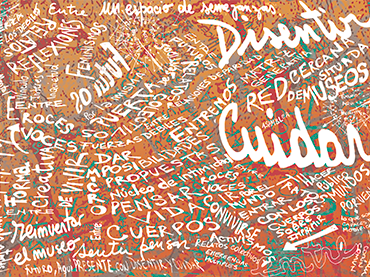
-
Sunday, 16, and Monday, 17 May 2021 Sabatini Building, Auditorium
Possible Futures. Cinema and Worlds to Come
This audiovisual series pivots on cinema’s future imagining with films made between 1920 and 2020, an historical expanse of one hundred years in which the future is manifested as an idea disputed between progress conceived as dogma, a radical critique of the present, and a yearning for new worlds. What are the imagined futures in the past and which future is projected and desired in our present?
Sunday, 16 May 2021 - 11:30am
Fritz Lang. Metropolis
Germany, 1926, b/w, silent, original version with intertitles in Spanish, restored digital archive, 152’Monday, 17 May 2021 – 6pm
Anton Vidokle. Immortality and Resurrection For All
Russia, 2017, colour, sound, original version in Russian with Spanish subtitles, digital archive, 34’―With a video presentation by Anton Vidokle
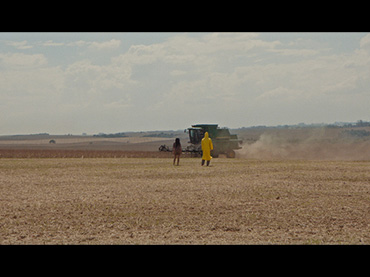
-
From 16 May 2021 Sabatini Building, Floor 1 and Nouvel Building, Roof
Three Centuries of Care. The Architecture of Museo Nacional Centro de Arte Reina Sofía
TicketsThree centuries on from the birth of Francisco Sabatini, the architect behind the building that housed the former Hospital General de Madrid — Madrid’s General Hospital — and today the site of Museo Reina Sofía, this project of grand modernity which primarily sought to care and heal is substantiated. In their desire to evoke the original architecture and imagine possible responses to present-day challenges, the actions here are set out in two of the Museo’s spaces, shining a light on two temporal and typological conceptions of the architecture that co-exist inside:
-
Sabatini Building, Floor 1
Illustrated Utopia. Plans for the Hospital General de Madrid project
This small show occasions a reflection on the infancy of the building from the perspective of the architecture, illustrated through plans of the eighteenth-century hospital displayed on the windows of the cloister on Floor 1, and thereby restoring a project of great architectural ambition and modernity, a project which, upon completion, would have constituted one of the largest hospitals in Europe. The plans bear witness to the colossal scale of the original project, of which only a third was ever built. Three centuries on, the updated value of these documents functions as an archaeology of the present, inside a context in which the role of the Museo is once again aligned towards care.
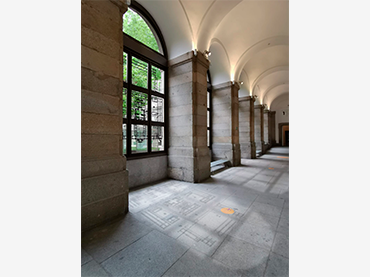
-
Nouvel Building, Roof
Museums that have never been. The architectural transformation of the old hospital into a cultural space
This intervention brings back the space of original circulation in the interior of the Nouvel Building roof for the public. Inside this space, visitors can discover the architectural transformation of the old hospital into a museum by way of a sound installation with recordings that reproduce the voice and testimonies of professionals who have been decisive in fashioning the building’s identity and were key to its conversion into a museum in the 1980s, either in its creative genesis (via projects that never materialised) or through contributions to its execution. In the 1980s, considerations revolved around how to put the former hospital to use; today, the same reflection leads us to imagine the nature of the Museo’s next architectural intervention.

-
Sunday, 16 May 2021 – 11am to 2pm Sabatini Building, Floor 1, Floor 2 and Garden
Torchbearer! Family activations in the rooms of the Museo
This proposal involves a series of actions and accompaniments in the rooms of the Museo that spark the curiosity of the youngest visitors. Rather than responding to a set itinerary or shaping a standard guided tour, these activations, spread out on Floors 1 and 2, as well as other spaces such as the Garden, illuminate different works in the Collection through an enquiring gaze.
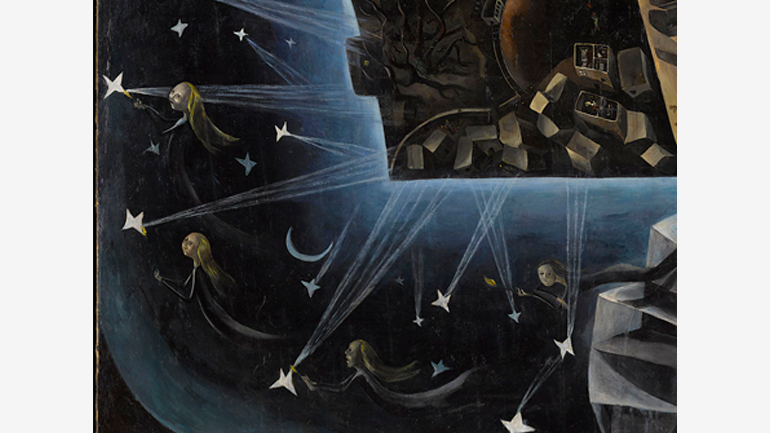
-
Sunday, 16, and Monday, 17 May 2021 Sabatini Building, Garden
Guided tours to exhibitions and to the Collection
TicketsSunday, 16 May 2021
10:15am–10:45am: Feminism. A Feminist Gaze on Avant-garde Movements
11am–12pm: Guernica. History of an Icon
1-1:30pm: Moroccan Trilogy. Memories of the Other ShoreMonday, 17 May 2021
11am-12pm: Feminism. A Feminist Gaze on Avant-garde Movements
1-1:30pm: Moroccan Trilogy. Memories of the Other Shore
4–4:30pm: Everything but the Same Old Thing. Modernity and Avant-garde
5-5:30pm: Feminism. A Feminist Gaze on Avant-garde Movements
6:15-7:15pm: Moroccan Trilogy. Memories of the Other Shore![Anglada Camarasa, Sonia de Klamery (echada) (Sonia de Klamery [Lying]), 1913 (ca.) Anglada Camarasa, Sonia de Klamery (echada) (Sonia de Klamery [Lying]), 1913 (ca.)](https://recursos.museoreinasofia.es/legacy_programs/feminismos-peq_1.gif)
-
Monday, 17 May 2021 – 12pm and 5:45pm Sabatini Building, Restoration Department
Restoration workshop guided tour
The Restoration Department organises a visit around its workshop to offer insight into the restoration process on Juan Gris’s work Portrait of Madame Josette Gris (1887–1927) from the Collection.
One of the Department’s restorers will offer an in-depth explanation of the different analysis methods used in the intervention, as well as the processes that have been carried out in order to conserve the work properly. For instance, they will describe the gigapixel studies with visible light, raking light and ultraviolet light, and infrared digital photography — technology which enables digital high-resolution images to be captured, outlining details that cannot be picked up by the naked eye — methods that have contributed invaluable information to gain extensive knowledge of the work. It has also enabled the undertaking of adding reversible elements to the frame, granting prior and subsequent protection of the paint, with a temperature control system and relative humidity, which will be vital when moving the painting in the future.
Length: 30 minutes per session
Department of Conservation and Restoration, sponsored by the MAPFRE Foundation
The restoration work has been funded with the help of a grant from the Bank of America Art Conservation Project
![Juan Gris, Portrait de Madame Josette Gris [Portrait of Madame Josette Gris], 1916 Juan Gris, Portrait de Madame Josette Gris [Portrait of Madame Josette Gris], 1916](https://recursos.museoreinasofia.es/legacy_programs/juan_gris.png)
-
Monday, 17 May 2021 – 6pm to 8pm Sabatini Building, Room 207 and online platform
Special programme with Radio 3
Online platformThe Museo Reina Sofía once again joins Radio 3 to celebrate International Museum Day. On this occasion, Room 207 will play host to a series of live performances which will be streamed live and direct on the Radio 3 website. The programme includes participation from Ángel Stanich, La Bien Querida, Mikel Erentxun, Rozalén and Sidonie.
Length: 20 minutes per session
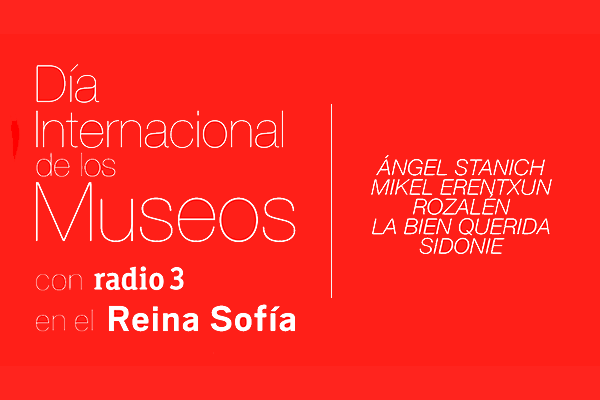
Más actividades
![Tracey Rose, The Black Sun Black Star and Moon [La luna estrella negro y negro sol], 2014.](https://recursos.museoreinasofia.es/styles/small_landscape/public/Obra/AD07091_2.jpg.webp)
On Black Study: Towards a Black Poethics of Contamination
Monday 27, Tuesday 28 and Wednesday 29 of April, 2026 – 16:00 h
The seminar On Black Study: Towards a Black Poethics of Contamination proposes Black Study as a critical and methodological practice that has emerged in and against racial capitalism, colonial modernity and institutional capture. Framed through what the invited researcher and practitioner Ishy Pryce-Parchment terms a Black poethics of contamination, the seminar considers what it might mean to think Blackness (and therefore Black Study) as contagious, diffuse and spreadable matter. To do so, it enacts a constellation of diasporic methodologies and black aesthetic practices that harbor “contamination” -ideas that travel through texts, geographies, bodies and histories- as a method and as a condition.
If Blackness enters Western modernity from the position of the Middle Passage and its afterlives, it also names a condition from which alternative modes of being, knowing and relating are continually forged. From within this errant boundarylessness, Black creative-intellectual practice unfolds as what might be called a history of touches: transmissions, residues and socialities that unsettle the fantasy of pure or self-contained knowledge.
Situated within Black radical aesthetics, Black feminist theory and diasporic poetics, the seminar traces a genealogy of Black Study not as an object of analysis but as methodological propositions that continue to shape contemporary aesthetic and political life. Against mastery as the horizon of study, the group shifts attention from what we know to how we know. It foregrounds creative Black methodological practices—fahima ife’s anindex (via Fred Moten), Katherine McKittrick’s expansive use of the footnote, citation as relational and loving labour, the aesthetics of Black miscellanea, and Christina Sharpe’s practices of annotation—as procedures that disorganise dominant regimes of knowledge. In this sense, Black Study is approached not as a discrete academic field but as a feel for knowing and knowledge: a constellation of insurgent practices—reading, gathering, listening, annotating, refusing, world-making—that operate both within and beyond the university.
The study sessions propose to experiment with form in order to embrace how ‘black people have always used interdisciplinary methodologies to explain, explore, and story the world.’ Through engagements with thinkers and practitioners such as Katherine McKittrick, C.L.R. James, Sylvia Wynter, Christina Sharpe, Fred Moten, Tina Campt, Hilton Als, John Akomfrah, fahima ife and Dionne Brand, we ask: What might it mean to study together, incompletely and without recourse to individuation? How might aesthetic practice function as a poethical intervention in the ongoing work of what Sylvia Wynter calls the practice of doing humanness?

Intergenerationality
Thursday, 9 April 2026 – 5:30pm
This series is organised by equipoMotor, a group of teenagers, young people and older people who have participated in the Museo Reina Sofía’s previous community education projects, and is structured around four themed blocks that pivot on the monstrous.
The third session gazes at film as a place from which to dismantle the idea of one sole history and one sole time. From a decolonial and queer perspective, it explores films which break the straight line of past-present-future, which mix memories, slow progress and leave space for rhythms which customarily make no room for official accounts. Here the images open cracks through which bodies, voices and affects appear, disrupting archive and questioning who narrates, and from where and for whom. The proposal is at once simple and ambitious: use film to imagine other modes of remembering, belonging and projecting futures we have not yet been able to live.

Remedios Zafra
Thursday March 19, 2026 - 19:00 h
The José Luis Brea Chair, dedicated to reflecting on the image and the epistemology of visuality in contemporary culture, opens its program with an inaugural lecture by essayist and thinker Remedios Zafra.
“That the contemporary antifeminist upsurge is constructed as an anti-intellectual drive is no coincidence; the two feed into one another. To advance a reactionary discourse that defends inequality, it is necessary to challenge gender studies and gender-equality policies, but also to devalue the very foundations of knowledge in which these have been most intensely developed over recent decades—while also undermining their institutional support: universities, art and research centers, and academic culture.
Feminism has been deeply linked to the affirmation of the most committed humanist thought. Periods of enlightenment and moments of transition toward more just social forms—sustained by education—have been when feminist demands have emerged most strongly. Awareness and achievements in equality increase when education plays a leading social role; thus, devaluing intellectual work also contributes to harming feminism, and vice versa, insofar as the bond between knowledge and feminism is not only conceptual and historical, but also intimate and political.
Today, antifeminism is used globally as the symbolic adhesive of far-right movements, in parallel with the devaluation of forms of knowledge emerging from the university and from science—mistreated by hoaxes and disinformation on social networks and through the spectacularization of life mediated by screens. These are consequences bound up with the primacy of a scopic value that for some time has been denigrating thought and positioning what is most seen as what is most valuable within the normalized mediation of technology. This inertia coexists with techno-libertarian proclamations that reactivate a patriarchy that uses the resentment of many men as a seductive and cohesive force to preserve and inflame privileges in the new world as techno-scenario.
This lecture will address this epochal context, delving into the synchronicity of these upsurges through an additional parallel between forms of patriarchal domination and techno-labor domination. A parallel in which feminism and intellectual work are both being harmed, while also sending signals that in both lie emancipatory responses to today’s reactionary turns and the neutralization of critique. This consonance would also speak to how the perverse patriarchal basis that turns women into sustainers of their own subordination finds its equivalent in the encouraged self-exploitation of cultural workers; in the legitimation of affective capital and symbolic capital as sufficient forms of payment; in the blurring of boundaries between life and work and in domestic isolation; or in the pressure to please and comply as an extended patriarchal form—today linked to the feigned enthusiasm of precarious workers, but also to technological adulation. In response to possible resistance and intellectual action, patriarchy has associated feminists with a future foretold as unhappy for them, equating “thought and consciousness” with unhappiness—where these have in fact been (and continue to be) levers of autonomy and emancipation.”
— Remedios Zafra

ARCO2045. The Future, for Now
Saturday 7, March 2026 - 9:30pm
The future, its unstable and subjective nature, and its possible scenarios are the conceptual focus of ARCOmadrid 2026. A vision of the future linked to recent memory, a flash of insight into a double-edged sword. This year's edition, as in the previous two, will once again hold its closing party at the Reina Sofia Museum. This time, the star of the show is Carles Congost (Olot, Girona, 1970), one of the artists featured in the new presentation of the Collections recently inaugurated on the 4th floor of the Sabatini Building.
Carles Congost, with his ironic and timeless gaze, is responsible for setting the tone for this imperfect future, with a DJ session accompanied by some of his works in the Cloister on the first floor of the Sabatini Building of the Museo on the night of Saturday 7 March.

27th Contemporary Art Conservation Conference
Wednesday, 4, and Thursday, 5 March 2026
The 27th Contemporary Art Conservation Conference, organised by the Museo Reina Sofía’s Department of Conservation and Restoration, with the sponsorship of the Mapfre Foundation, is held on 4 and 5 March 2026. This international encounter sets out to share and debate experience and research, open new channels of study and reflect on conservation and the professional practice of restorers.
This edition will be held with in-person and online attendance formats, occurring simultaneously, via twenty-minute interventions followed by a five-minute Q&A.